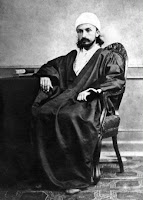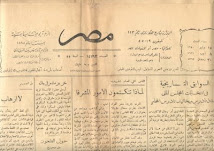Our fellow citizens:
The events of recent months have provided us, the Bahá’ís of Egypt, with an opportunity we have never experienced before: to communicate directly with you, our brothers and sisters. Though small in number, we are privileged to belong to this land wherein, for more than a hundred years, we have endeavoured to live by the principles enshrined in our Faith and striven to serve our country as upright citizens.
This chance is one for which we have longed—especially because we have wished to express our thanks to those countless fair-minded, compassionate souls who supported our efforts in the last few years to obtain a measure of equality before the law. But we rejoice primarily in the fact that, at such a critical juncture in our nation’s history, we are able to make a humble contribution to the conversation which has now begun about its future and to share some perspectives, drawn from our own experience and that of Bahá’ís throughout the world, as to the prerequisites for walking the path towards lasting material and spiritual prosperity.
Whatever directly motivated the rapid change that has occurred, the outcome demonstrates the collective desire of us all, the people of Egypt, to exercise greater control over our destiny. The freedom to do so is unfamiliar to us, having not previously enjoyed this degree of liberty. And our collective history, as Egyptians, Arabs, and Africans, has taught us that there is no shortage of self-interested forces in the world that would prevent us from determining our own future or, alternatively, would invite us to voluntarily abdicate this responsibility. Colonialism, religious orthodoxy, authoritarian rule, and outright tyranny have all played their part in the past. Today, the “gentler” force of consumerism and the erosion of morality which it fosters are equally capable of holding us back, under the pretence of making us more free.
The fact that, as a people, we have chosen to become actively involved in determining the direction of our nation is a public sign that our society has reached a new stage in its development. A planted seed grows gradually and organically, and evolves through stages of increasing strength until it attains to a state that is recognizably “mature”; human societies share this trait too. At a certain time, dissatisfaction grows within a population at being held back from full participation in the processes that steer the course of a country, and the desire for more responsibility to be ceded to the citizens becomes overwhelming. Set in this context, the events that have taken place in Egypt can be seen as a response to forces that are, in fact, drawing the entire human race towards greater maturity and interdependence. One indication that humanity is advancing in this direction is that aspects of conduct which did not seem out of place in an earlier age—behaviours that resulted in conflict, corruption, and inequality—are increasingly seen as incompatible with the values that underpin a just society. Over time, people everywhere are becoming bolder in rejecting the attitudes and systems that prevented their progress towards maturity. The movement towards greater maturity is thus a global phenomenon. Still, it does not follow that all nations and peoples advance along the path at a uniform speed. At certain points, circumstances may converge upon a historically significant moment wherein a particular society can fundamentally re-direct its course. At such times, an expression of collective will can have a decisive and abiding effect on the future of the country. Egypt has arrived at precisely such a moment. It will not last forever.
At this juncture, then, we face the weighty question of what we seek to achieve with the opportunity we have acquired. What are the choices before us? Many models of collective living are on offer and being championed by various interested parties. Are we to move towards an individualistic, fragmented society, wherein all feel liberated to pursue their own interests, even at the expense of the common good? Will we be tempted by the lures of materialism and its beholden agent, consumerism? Will we opt for a system that feeds on religious fanaticism? Are we prepared to allow an elite to emerge that will be oblivious to our collective aspirations, and may even seek to manipulate our desire for change? Or, will the process of change be allowed to lose momentum, dissolve into factional squabbling, and crumble under the weight of institutional inertia? It might justly be argued that, looking across the Arab region—and, indeed, beyond—the world wants for an unquestionably successful model of society worthy of emulation. Thus, if no existing model proves to be satisfactory, we might well consider charting a different course, and perhaps demonstrate to the community of nations that a new, truly progressive approach to the organization of society is possible. Egypt’s stature in the international order—its intellectual tradition, its history, its location—means that an enlightened choice on its part could influence the course of human development in the entire region, and impact even the world.
Too often, change brought about by popular protest eventually results in disappointment. This is not because the movement that provided the catalyst for change lacks unity—indeed, its ability to foster unity among disparate peoples and interests is the essential feature that ensured its success—but rather because the realization quickly dawns that it is far easier to find common cause against the status quo than it is to agree upon what should replace it. That is why it is vital that we endeavour to achieve broad consensus on the operating principles that are to shape a new model for our society. Once agreement is reached, the policies that follow are far more likely to attract the support of the populations whom they affect.
A natural temptation, when considering how our nation should progress, is to immediately seek to devise practical solutions to recognized grievances and acknowledged societal problems. But even if worthy ideas were to emerge, they would not constitute in themselves a compelling vision of how we wish our country to develop. The essential merit of principle is that, if it wins support, it induces an attitude, a dynamic, a will, an aspiration, which facilitate the discovery and implementation of practical measures. Yet a discussion of principles must be prepared to move beyond the level of abstraction. At the conceptual level, it may prove relatively easy to bring about agreement on a set of guiding principles, but without an examination of their ramifications they may amount to little more than empty slogans. An attempt to reach consensus should allow for the most searching exploration of the specific, and profound, implications that the adoption of a particular principle would carry for our nation. It is in that spirit, then, that the following principles are set out.
A mature society demonstrates one feature above all others: a recognition of the oneness of humanity. How fortunate, then, that the most abiding memory of recent months is not of religious divisions or ethnic conflict, but of differences being put aside in favour of a common cause. Our instinctive ability, as a people, to recognize the truth that we all belong to one human family served us well. Nevertheless, to develop institutions, agencies, and social structures that promote the oneness of humanity is an altogether greater challenge. Far from being an expression of vague and pious hope, this principle informs the nature of those essential relationships that must bind all the states and nations as members of one human family. Its genesis lies in the recognition that we were all created out of the same substance by the one Creator, and therefore, it is indefensible for one person, tribe, or nation to claim superiority over another. Its acceptance would require an organic change in the structure of present-day society, a change with far-reaching consequences for every aspect of our collective life. And beyond its societal implications, it calls for a profound re-examination of each of our own attitudes, values, and relationships with others—ultimately, for a transformation in the human heart. None of us are exempt from its exacting demands.
The ramifications of this fundamental truth—the oneness of humanity—are so profound that many other vital principles, essential for the future development of Egypt, can be derived from it. A prime example is the equality of men and women. Does anything retard progress in our country more efficiently than the persistent exclusion of women from full participation in the affairs of the nation? Redressing this balance will by itself bring about improvement in every aspect of Egyptian life: religious, cultural, social, economic, and political. Like the bird that cannot fly if one wing is weaker than the other, so humanity’s ability to scale the heights of real attainment are severely impeded so long as women are denied the opportunities afforded to men. Once the same prerogatives are accorded both sexes, they will both flourish, to the benefit of all. But beyond the matter of civil rights, the principle of gender equality brings with it an attitude that must be extended to the home, to the workplace, to every social space, to the political sphere—ultimately, even to international relations.
Nowhere could the equality of the sexes more helpfully be established than in education, which exists to enable men and women of every background to fulfil their innate potential to contribute to the progress of society. If it is to succeed, it must offer adequate preparation for participation in the economic life of the nation, but so, too, it must possess a robust moral dimension. Schools must impress upon their students the responsibilities inherent in being a citizen of Egypt and inculcate those values that tend toward the betterment of society and care for one’s fellow human beings. Education cannot be allowed to be the means whereby disunity and hatred of others are instilled into innocent minds. With the right approach, it can also become an effective instrument for protecting future generations from the insidious blight of corruption that so conspicuously afflicts present-day Egypt. Furthermore, access to basic education must be universal, regardless of any distinctions based on gender, ethnicity, or means. Strategies for harnessing the resources of our nation—our heritage, our agriculture, our industry—will prove fruitless if we neglect the most important resource of all: our own God-given spiritual and intellectual capacities. To prioritize improving the means by which we educate ourselves will yield an abundant harvest in the years to come.
Related to the topic of education is the interaction between science and religion, twin sources of insight that humanity can draw upon as it seeks to achieve progress. It is a blessing that Egyptian society, as a whole, does not assume that the two must be in conflict, a perception sadly commonplace elsewhere. Indeed, we possess a proud history of fostering a spirit of rational and scientific enquiry—with admirable results in the areas of farming and medicine, to name but two—while retaining a strong religious tradition and respect for the values promulgated by the world’s great faiths. There is nothing in such values that should incline us toward irrational thinking or fanaticism. All of us, especially our younger generation, can be conscious that it is possible for individuals to be imbued with sincere spirituality while actively labouring for the material progress of their nation.
Our nation is blessed by an abundance of youth. Some amongst us are in education; some are beginning careers or starting families; some, though older, remember what it was like to pass through those stages of life. Reform of the education system will go a long way towards ensuring that the potential of the younger generation to contribute to the life of society is realized; however, by itself, that is not sufficient. Conditions must be nurtured so that opportunities for meaningful employment multiply, talent is harnessed, and possibilities to progress are accessed on the basis of merit, not privilege. Disenchantment will grow if, because of persistent corruption, inequality, and neglect, the efforts youth make to improve the conditions of families, communities, and neighbourhoods are thwarted at every turn. The high aspirations of the young represent a trust that society as a whole—indeed, the state itself—cannot afford, either economically or morally, to ignore.
This is not to say that youth are in need of special privileges. Much of the dissatisfaction that younger adults have expressed in recent months comes from an acute awareness that they lack equality of opportunity, not preferential treatment. From the conditions faced by the youth and by so many others in our society it is clear that pre-eminent among the principles that should propel the renewal we seek is justice. Its far-reaching implications are at the core of most of the issues on which we must, as a people, agree. And it is from the interplay of the two vital principles of justice and the oneness of humanity that an important truth emerges: each individual comes into the world as a trust of the whole, and the collective resources of the human race should therefore be expended for the benefit of all, not just a fraction. Neglect of this ideal has a particularly destabilizing influence on society, as extremes of wealth and poverty exacerbate existing social tensions and provoke unrest. Measures to alleviate poverty cannot ignore the existence of extreme wealth, for where there are inordinate riches accumulated by the few, the many will not escape impoverishment.
Considered only in the abstract, perhaps few will dispute the essential merit of the principles discussed here. Yet, their implementation would have profound political, economic, social, and personal implications, which render them more challenging than they may appear at first. But regardless of the principles to be adopted, their capacity to imprint themselves on our emerging society will depend in large measure on the degree to which Egyptians have embraced them. For to the extent that all can be enabled to participate in the consultative processes that affect us—so that we tread the path towards becoming protagonists of our own material and spiritual development—will we avoid the risk of our society falling into the pattern of any of the existing models that see no advantage in empowering the people.
The challenge before us, then, is to initiate a process of consultation about the principles that are to inform the reshaping of our society. This is a painstaking task. To fashion from divergent conceptions a coherent set of principles with the creative power to unify our population will be no small accomplishment. However, we can be confident that every sincere effort invested for this purpose will be richly rewarded by the release, from our own selves, of a fresh measure of those constructive energies on which our future depends. In such a broadly based national conversation—engaging people at all levels, in villages and in cities, in neighbourhoods and in the home, extending to the grassroots of society and drawing in every concerned citizen—it will be vital that the process not move too quickly to the pragmatic and the expedient, and not be reduced to the deals and decisions involved in the distribution of power among a new elite who would presume to become the arbiters of our future.
The ongoing and wide-scale involvement of the population in such a consultative process will go a long way towards persuading the citizenry that policy-makers have the creation of a just society at heart. Given the opportunity to participate in such a process, we will be confirmed in our newly awakened consciousness that we have ownership of our own future and come to realize the collective power we already possess to transform ourselves.












.jpg)





 vernment requires that its citizens identify as either Jewish, Christian, or Muslim, leaving others to either misrepresent their faith or forego valid identity documents, passports, birth and death certificates, and marriage licenses.
vernment requires that its citizens identify as either Jewish, Christian, or Muslim, leaving others to either misrepresent their faith or forego valid identity documents, passports, birth and death certificates, and marriage licenses.  Dr. Rauf Hindi Haleem, the father of the two children, has said that the birth certificates for his twins
Dr. Rauf Hindi Haleem, the father of the two children, has said that the birth certificates for his twins 
 مصرية، مؤكدا بأنه وبعد 5 سنوات استطاع البهائيون أن يحصلوا على حق استخراج أوراقهم الثبوتية بكتابة (- ) أمام خانة الديانة، مما يؤكد على نزاهة القضاء المصرى.ويضيف هندى أن الإجراءات استغرقت حوالى شهرين لاستخراج شهادتى الميلاد، نظرا لأنها أول ورقة رسمية تحمل ( - ) إلا أننا نتمنى أن تتم هذه الإجراءات بطريقة أكثر يسرا فى الحالات القادمة.
مصرية، مؤكدا بأنه وبعد 5 سنوات استطاع البهائيون أن يحصلوا على حق استخراج أوراقهم الثبوتية بكتابة (- ) أمام خانة الديانة، مما يؤكد على نزاهة القضاء المصرى.ويضيف هندى أن الإجراءات استغرقت حوالى شهرين لاستخراج شهادتى الميلاد، نظرا لأنها أول ورقة رسمية تحمل ( - ) إلا أننا نتمنى أن تتم هذه الإجراءات بطريقة أكثر يسرا فى الحالات القادمة.







